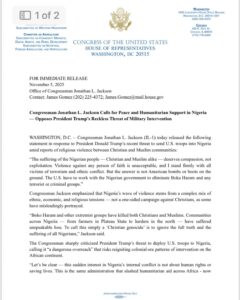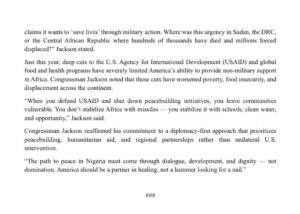Rejecting threats of U.S. military intervention, Jackson calls for diplomacy, dignity, and humanitarian partnership with Africa’s largest democracy.

By Princess G. Adebajo- Fraser. MFR.
Washington, D.C. / Abuja — November 2025
As tensions mount between Washington and Abuja, Congressman Jonathan L. Jackson (D-IL-1) has emerged as one of the few American lawmakers urging peace, not punishment toward Nigeria.
In a statement released November 5, 2025, Jackson condemned former President Donald Trump’s threat to deploy U.S. troops over alleged attacks on Christians, describing it as “dangerous overreach” and a return to colonial-era interventionism.
Compassion, Not Exploitation
> “The suffering of the Nigerian people — Christian and Muslim alike — deserves compassion, not exploitation,” Jackson wrote. “Violence against any person of faith is unacceptable … but the answer is not American bombs or boots on the ground.”

Jackson’s tone broke sharply from Washington’s hawkish mood. While some have portrayed Nigeria’s crisis as a “Christian genocide,” the congressman emphasized its deeper reality: a mix of ethnic, economic, and religious tensions exploited by extremists.
> “Boko Haram and other groups have killed both Christians and Muslims,” he noted. “To call this simply a ‘Christian genocide’ is to ignore the full truth and the suffering of all Nigerians.”
Rejecting Military Adventurism
Calling Trump’s posture “reckless,” Jackson warned that a U.S. invasion would destabilize Nigeria and reignite old patterns of foreign domination.
> “This sudden interest in Nigeria’s internal conflict is not about human rights or saving lives,” he said. “This is the same administration that slashed humanitarian aid across Africa — now claiming it wants to ‘save lives’ through military action.”

He asked why no such urgency existed in Sudan, the DRC, or the Central African Republic, where conflict has displaced millions. His challenge exposed a selective morality: intervention often follows interest, not compassion.
Cuts to Aid, Yet Talk of War
Jackson underscored the irony of threatening invasion while cutting development funds.
> “When you defund USAID and shut down peace-building initiatives, you leave communities vulnerable,” he argued. “You don’t stabilize Africa with missiles — you stabilize it with schools, clean water, and opportunity.”
Deep reductions to USAID and global food-health programs, he said, had already worsened poverty and displacement across Africa. His remedy was straightforward: restore aid, rebuild trust, and engage respectfully.
A Blueprint for Partnership

Beyond critique, Jackson reaffirmed a diplomacy-first framework that prioritizes:
Peacebuilding and humanitarian aid over coercion.
Regional cooperation through African institutions.
Development and dignity rather than domination.
> “The path to peace in Nigeria must come through dialogue, development, and dignity,” he concluded. “America should be a partner in healing, not a hammer looking for a nail.”
Strategic Meaning
His dissent arrives as U.S.–Nigeria relations wobble. Nigeria’s entry into BRICS, its currency-swap with China, and energy deals with Russia have unsettled Washington. Meanwhile, Nigeria rejected its “Country of Particular Concern” (CPC) label on religious freedom, calling it unfair.
Against this backdrop, Jackson’s letter signals an alternative current in U.S. politics — one that favors respect, not reprimand. His stance encourages dialogue precisely when both nations risk drifting apart.
Why Jackson’s Stand Matters
Jackson’s statement re-centers U.S. engagement on moral credibility. His call for compassion challenges Washington’s reflex to wield military tools in crises born of poverty, corruption, and weak governance.
For Nigeria, the letter offers validation: that not all in Congress see Africa as a theater for intervention. For the United States, it is a reminder that global leadership depends on humility as much as power.

 Areas for Improvement in Jackson’s Appeal
Areas for Improvement in Jackson’s Appeal
Jackson’s moral clarity is refreshing, but his case would gain force with sharper policy detail.
Below are ten practical ways the congressman could strengthen his framework — turning principled dissent into a roadmap for action.
Pair ideals with instruments. Propose tangible tools — GAO audits of security aid, Leahy vetting, Global Magnitsky sanctions on abusers, and a defined USAID supplemental for Nigeria’s northeast.
Quantify humanitarian aid. Specify scale and channel: e.g., a $250 million, 18-month relief package via WFP and UNICEF targeting Borno, Adamawa and Yobe.
Tackle the CPC label head-on. Suggest a 120-day State Department review tied to measurable protection of all faith communities and transparent prosecutions of religious-based attacks.

Balance the religious narrative. Acknowledge attacks on both churches and mosques — avoiding the perception of minimizing Christian persecution while underscoring shared victimhood.
Create a U.S.–Nigeria Accountability Compact. A quarterly forum involving Congress, State, Defense, and Nigerian ministries could track aid, procurement transparency, and arms end-use.
Address Nigeria’s defense-sector corruption. Back an external audit of procurement since 2015 and introduce digital serial-number tracking for all imported weapons.
Offer a credible counter-terrorism model. Replace “no troops” with an intelligence-led, community-anchored approach: border tech, deradicalization outside the army, and civilian-harm tracking.
Build bipartisan resonance. Frame restraint as fiscal discipline — no blank checks, no forever wars — to attract Republican and veteran support.
Use data for credibility. Anchor arguments in UN/INGO figures on displacement, fatalities, and school closures. Facts harden moral appeal.

Name regional partners. Operationalize “regional partnerships” through ECOWAS, the African Union, and the Lake Chad Basin Commission, backed by U.S. technical support and transparency.
By integrating these measures, Jackson could transform an admirable moral stance into an actionable bipartisan agenda—marrying compassion with oversight and strategy.
Editorial Perspective
Congressman Jackson’s dissent is rare in its courage and precision. In a city quick to equate toughness with troops, he reminds Washington that leadership begins with listening. His insistence that peace grows from schools, not missiles, restores a clarity long absent in U.S. Africa policy.
At the same time, his statement invites a necessary challenge: morality must meet mechanics. Words of compassion should drive policy frameworks that deliver water pumps, audits, and peacekeepers — not just applause. If Jackson or his allies codify these ideas into legislation or hearings, they could reset America’s engagement with Nigeria on cooperative, accountable terms.
Conclusion

Congressman Jonathan L. Jackson’s stand is both principled and pragmatic. He refuses to let Nigeria’s crisis become a pretext for another foreign adventure. His appeal — to replace missiles with mentorship, and coercion with compassion — is a reminder that peace is built, not imposed.
For Nigeria, his voice offers rare validation amid suspicion; for America, it calls for a return to its highest ideals. If Washington heeds that message, diplomacy may yet triumph over domination.

Princess Gloria Adebajo-Fraser MFR.
The National Patriots Movement.



